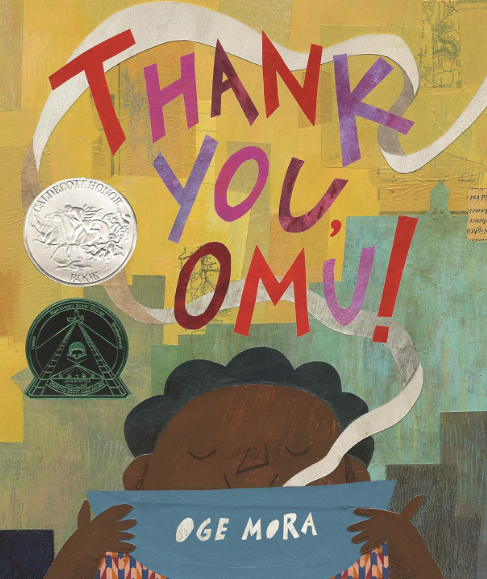
Art Form: Theatre
Supplies Needed
-Thank You, Omu book
Vocabulary
Character - a person in a story or play, or an
animal or object that has human qualities
Vocal Expression - the way an actor uses their
voice to portray a character or to convey feelings, often involving choices about pitch or volume
Pitch - how high or low/deep an actor’s voice is
to portray a character
Volume - how loud or soft/quiet an actor’s voice
is to portray a character
Posture - how an actor stands or positions their
body to portray a character
Instructions
1. Read the book, Thank You, Omu. Look at Omu and the three characters that first come to Omu’s door – the boy with the red car, the police officer, and the hot dog vendor.
2. With a family member or friend, decide who will be Omu and who will be the boy with the red car. Each actor should think about how to change their voice and what posture to adopt to become their character.
3. Reread the page where the boy comes to Omu’s door. Reread what they say to each other. The actor playing the boy can go to a doorway and knock. Then, act out the scene, using your vocal expression and posture choices to be the characters.
4. Repeat the process for the pages with the police officer and the hot dog vendor. You can switch roles so that each actor gets to play both Omu and a visitor.
5. Find simple costume pieces or props (a shawl for Omu, a toy car for the boy, a cap for the police officer, an apron for the hot dog vendor) to use to add to the scene.
Extensions
Choose three more characters from the page with all the other people that came and enact scenes when they came to Omu’s door. Try to make each character’s voice and posture different. Do they talk fast or slow? Do they have an accent or a particular way of talking?
Choose a character and think about how they know Omu. Act out when they met. What would they say to each other? What would they say to each other if they met somewhere else?

About
The REimagining and Accelerating Literacy through Arts Integration (REALAI) grant supports the literacy achievement of 3,200 students and 170 teachers, media specialists, and literacy coaches across six schools in Georgia and South Carolina.
In addition to professional learning for educators, this project contributes significantly to school library collections through the purchase of developmentally appropriate and culturally relevant books.
This grant also includes parent events to provide families with access to books and other content about how to support their child’s reading development.
